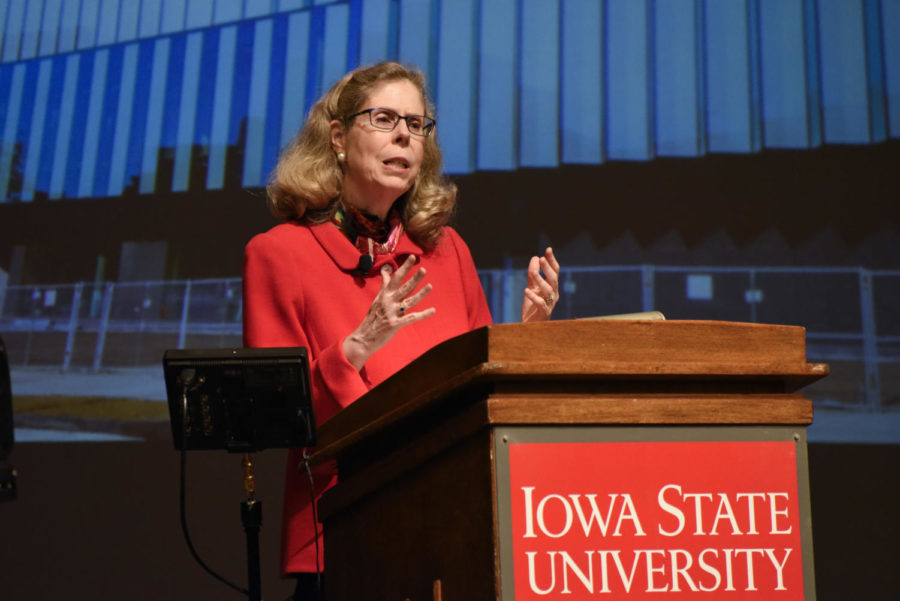- News
- News / Politics And Administration
- News / Politics And Administration / Campus
- News / Politics And Administration / State
President Wendy Wintersteen shares financial impact of COVID-19 on Iowa State
President Wendy Wintersteen gives her 2019-20 State of the University address Sept. 11. Wintersteen spoke on campus climate at the Board of Regents meeting.
April 30, 2020
The Iowa Board of Regents hosted a virtual meeting April 30 where it heard Iowa State President Wendy Wintersteen discuss the financial impact of COVID-19 on Iowa State.
Wintersteen praised the Iowa State community and faculty for responding to the COVID-19 pandemic quickly for ensuring critical university operations continue.
“Nonetheless, the financial impact on Iowa State University will be unprecedented,” Wintersteen said. “Iowa State’s response to the crisis began 95 days ago when we activated our Emergency Operations Center and started to establish 12 working groups with expertise in specific issues like academic continuity, workforce protection and finance and logistics. This allowed us to take a swift, coordinated and thoughtful approach as the COVID-19 outbreak spread and eventually hit Iowa.”
Wintersteen said the decisions made have been rooted in guidance from Gov. Kim Reynolds, the Iowa Department of Public Health and the Centers for Disease Control and Prevention. Decisions Wintersteen mentioned were the recall of Iowa State University students studying abroad in Italy and eventually the cancellation of all study abroad courses.
“Iowa State immediately began incurring costs for flight changes to help our students get home as well as refunds for programs cut short or canceled,” Wintersteen said. “On March 11, Iowa State announced the move to virtual instruction for two weeks following spring break and all university events were canceled, postponed or moved online during that time period. […] As the pandemic escalated the next week, we made the move to extend virtual instruction through the end of the semester. We immediately initiated discussions about refunds for housing, dining, course fees and parking.”
Wintersteen said they decided to issue pro-rated refunds for course fees that supported hands-on components such as field trips and lab equipment.
Additionally, the university issued refunds for the unused portion of the housing and dining contracts and parking permits.
“To give you an idea, of the 6,400 students living in our residence halls, only 280 remain,” Wintersteen said. “[…] Our usually bustling campus has gone quiet as conferences, seminars, athletic events and other performances have been called off.”
As the number of event cancellations continued to increase, Wintersteen said the loss revenue multiplied.
“While loss revenue are a predominant part of the equation, the other piece is additional expense,” Wintersteen said. “The most significant expense right now is for personal protective equipment and cleaning supplies for our front-line staff in health care, public safety and facilities. We’ve also incurred incremental cost to move courses online and support employees working remotely.”
An early estimate totaled more than $88 million in refunds and loss revenue and close to $1 million in additional expenses, Wintersteen said. This initial projection covered the time period from early March to the end of August.
“While uncertainty remains, you can count on Iowa State University to fulfill our land grant mission, to serve our students and to serve all Iowans,” Wintersteen said.







